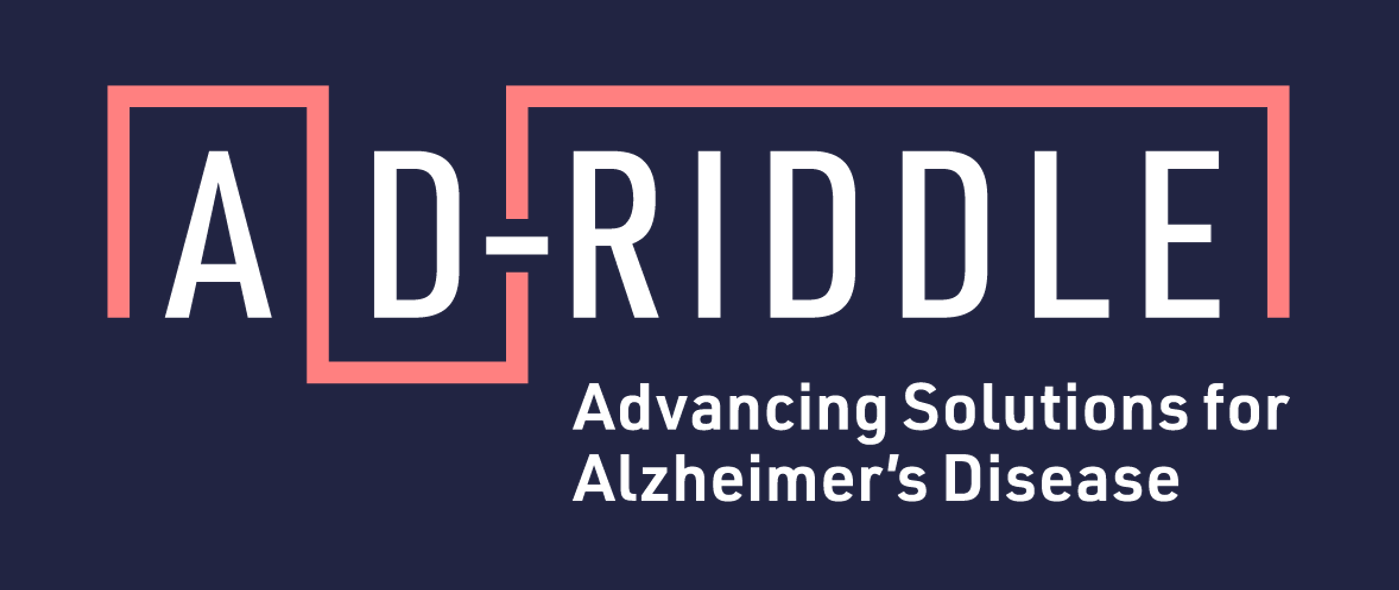Summary
Around 7 million people are living with Alzheimer’s disease in Europe alone, and that number is set to double by 2050. Although there is no cure, there are now treatments that can slow the progress of the disease. In addition, we now have a greater understanding of the lifestyle changes that can reduce people’s risk of Alzheimer’s disease. We also know that the first signs of Alzheimer’s disease appear in the brain several years before people start to develop symptoms. This effectively means that there is a huge window of opportunity for people to take action to delay disease onset, and slow disease progression.
The aim of the AD-RIDDLE project is to revolutionise the way Alzheimer’s disease is detected, diagnosed, prevented, and treated. It will do this by delivering a ‘toolbox platform’ of validated resources with resources designed for patients, caregivers and healthcare providers. This toolbox platform is designed to be modular and customizable, allowing health systems and healthcare providers to tailor component tools to the unique needs of different settings and practices.
The toolbox platform will offer a digital community engagement portal comprising self-guided assessment tools for people concerned about their dementia risk, as well as pathways for referral to the appropriate healthcare services and resources that ordinary people can easily use.
The platform will also include an array of screening and diagnostic tools to help identify those at risk of developing Alzheimer’s disease and diagnose those who already have it. These tools will include both blood-based biomarker tests and digital cognitive assessments. Healthcare providers will also have access to a decision support toolkit, powered by algorithms, to assist in the diagnosis, prevention and management of Alzheimer’s disease. Finally, the platform will help to ensure that patients benefit from personalised therapies including lifestyle interventions and medicines.
The modular toolbox will be tested in different healthcare settings (e.g. memory clinics, primary care) across six European countries. Data from AD-RIDDLE will be hosted by the European Platform for Neurodegenerative Diseases (EPND), an Innovative Medicines Initiative project developing secure, accessible and sustainable ways to share research data and biosamples.
AD-RIDDLE brings together patient organisations, representatives of diverse industries, universities, healthcare providers and regulatory bodies. Together, they will help to pioneer a new approach to the way we prevent, diagnose and manage Alzheimer’s disease, and empower patients with practical information to help them safeguard their own cognitive health for as long as possible.
Achievements & News
March 2024
The new IHI project hopes its ‘toolbox platform’ will dramatically change the way we detect, diagnose, prevent and treat Alzheimer’s...
March 2024
The papers in Frontiers in Neurology demonstrate how public-private collaborative research through IMI and now IHI is making a difference...
Participants
Show participants on mapUniversities, research organisations, public bodies, non-profit groups
- Alzheimer'S Disease International The International Federation Of Alzheimer'S Disease And Related Disorders Societies Inc, Lincolnshire, Illinois, United States
- Fundacio Barcelonabeta Brain Research Center, Barcelona, Spain
- Goeteborgs Universitet, Gothenburg, Sweden
- Imperial College Of Science Technology And Medicine, London, United Kingdom
- Itä-Suomen yliopisto, Kuopio, Finland
- Karolinska Institutet, Stockholm, Sweden
- Lunds Universitet, Lund, Sweden
- National Institute For Health And Care Excellence, Manchester, United Kingdom
- Region Stockholm, Stockholm, Sweden
- Stichting Amsterdam Umc, Amsterdam, Netherlands
- Stiftelsen Fingers Brain Health Institute, Stockholm, Sweden
- Universita Degli Studi Di Perugia, Perugia, Italy
- Universiteit Maastricht, Maastricht, Netherlands
- University Of Leicester, Leicester, United Kingdom
Small and medium-sized enterprises (SMEs) and mid-sized companies (<€500 m turnover)
- Alzheimer Europe, Luxembourg, Luxembourg
- Synapse Research Management Partners SL, Barcelona, Spain
IHI industry partners
- Fujirebio Europe Nv, Zwijnaarde Gent, Belgium
- Gates Ventures Llc, Kirkland, United States
- Sanofi-Aventis Recherche & Developpement, Chilly Mazarin, France
Contributing partners
- C2n Diagnostics Llc, St. Louis, United States
- Cambridge Cognition Limited, Cambridge, United Kingdom
- Combinostics Oy, Valkeakoski, Finland
- Davos Alzheimer'S Collaborative, Geneva, Switzerland
- Neotiv GMBH, Magdeburg, Germany
| Participants | |
|---|---|
| Name | EU funding in € |
| Alzheimer Europe | 538 000 |
| Alzheimer'S Disease International The International Federation Of Alzheimer'S Disease And Related Disorders Societies Inc | 157 000 |
| Fundacio Barcelonabeta Brain Research Center | 1 038 000 |
| Goeteborgs Universitet | 1 095 250 |
| Itä-Suomen yliopisto | 929 000 |
| Karolinska Institutet | 734 250 |
| Lunds Universitet | 1 095 250 |
| Region Stockholm | 2 932 750 |
| Stichting Amsterdam Umc | 1 121 250 |
| Stiftelsen Fingers Brain Health Institute | 590 250 |
| Synapse Research Management Partners SL | 803 250 |
| Universita Degli Studi Di Perugia | 519 000 |
| Universiteit Maastricht | 537 000 |
| Total Cost | 12 090 250 |
